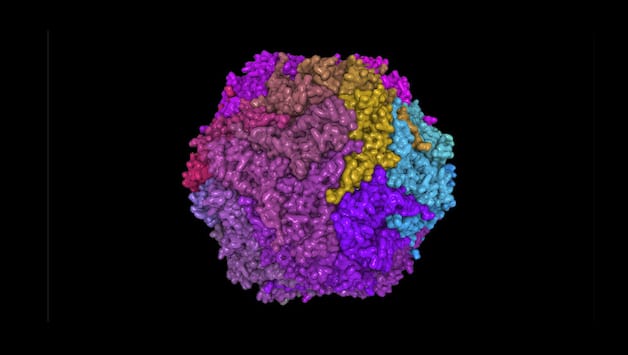Not harmless: For the first time, doctors have discovered a representative of the circoviruses that can also make us humans ill. The new species, dubbed HCirV-1, can damage liver cells and cause hepatitis, as shown in an immunocompromised patient. These circoviruses could also be behind other cases of liver inflammation of unknown cause, as the researchers explain. So far, this group of viruses was considered harmless to us humans, it was only known to trigger some animal diseases in birds and pigs.
Circoviruses were only discovered in 1974 and have hardly been studied to date. The viruses, which are very small with a diameter of up to 30 nanometers, have a simple structure and do not have a shell. Their genome consists of single-stranded DNA that is formed into a ring – from which the name “Circo-” is derived. So far, these viruses have been considered pure animal pathogens, among other things they are known to be the causative agent of a deadly disease in parrots and two diseases in pigs. For humans, however, the circoviruses have so far been considered completely harmless.
This has changed now. Because a newly discovered variant of the circoviruses can not only infect us humans, it can also make us ill. This was discovered by Philippe Pérot from the Institut Pasteur in Paris and his colleagues when they were investigating a patient with a mysterious liver infection. The elderly woman had received a heart and lung transplant 17 years earlier and was therefore taking immunosuppressive drugs. In early 2022, she was hospitalized for chronic hepatitis.
When the doctors looked for the cause of her liver inflammation, they could not find anything at first: neither one of the common hepatitis pathogens nor any other infection with known bacteria or viruses could be detected. In addition, the woman had not consumed alcohol, illegal drugs, paracetamol or herbal preparations of unclear composition. Still, her liver showed clear signs of inflammation. But why?
Only a computer-assisted search for gene sequences of unknown origin brought clarity. They revealed the presence of a previously unknown circovirus in the patient’s blood and liver tissue. This is the first time researchers have discovered a circovirus that can make us humans ill. “That was completely unexpected,” says Pérot’s colleague Marc Eloit. Because the discovery of new human pathogenic viruses in Europe is extremely rare. The researchers have named this new virus “human circovirus-1”, or HCirV-1 for short.
More detailed analyzes revealed that HCircV-1 can infect human liver cells, multiply in them and thereby damage them. This explains the hepatitis symptoms of the immunocompromised patient. According to the scientists, the new virus could also be responsible for unexplained cases of hepatitis in other patients – for example for the mysterious hepatitis epidemic that hit children in Great Britain in particular, but also in some other European countries at the beginning of 2022.
How and where the woman contracted this new virus is still unknown. She had neither traveled nor received a blood transfusion prior to her infection. According to the DNA comparisons, HCirV-1 is not derived from the circoviruses found in birds or pigs in Europe. “Instead, phylogenetic analyzes place this pathogen in the vicinity of several virus variants previously only known to occur in exotic wild animals,” the physicians report. This makes direct transmission from these animals to the patient unlikely.
“We suspect that HCirV-1, while of animal origin, may have been transmitted through food, similar to the hepatitis E virus,” write Pérot and his colleagues. Hepatitis E can reach humans through undercooked pork or game meat and products made from it, but direct transmission from person to person is rare.
It is still unclear whether and to what extent the new circovirus can be transmitted from person to person. Studies have shown, however, that HCirV-1 was also detectable in the patient’s saliva, urine and faeces. According to the researchers, it still has to be clarified whether contact with body fluids or perhaps even aerosols in the air we breathe can lead to infection with the virus. They have already developed a PCR test for the new circovirus. (Emerging Infectious Diseases, 2023; doi:10.3201/eid2902.221468)
What: Pasteur Institute
This article was written by Nadja Podbregar
Cristiano Ronaldo is apparently his private plane too small. The football star has now sold his Gulfstream G200. Supposedly he wants a bigger jet.
Boris Becker is apparently enjoying life to the fullest after his imprisonment. However, his insolvency administrator does not like that at all.
The original of this article “Researchers discover new virus that attacks the liver” comes from scinexx.















